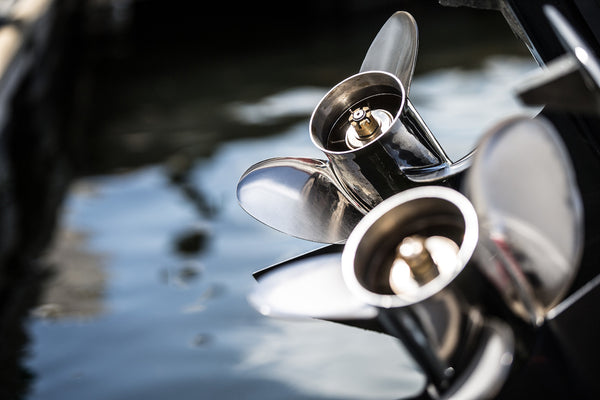
Performance Impact of a Damaged Prop and What to Do About It.
Performance Impact of a Damaged Prop and What to Do About It.
Are you a boat owner who is worried that your propeller may be damaged? If so, you’re likely concerned about how it might affect the performance of your boat. It’s important to know that damage to your prop can have serious effects on both the speed and efficiency of your vessel, not just its maneuverability. In this blog post, we'll dive into all aspects of prop damage in order to give you an understanding of what exactly happens when a prop gets injured and what performance impacts will result. This knowledge will help ensure safe boating for you, as well as peace of mind about the condition and abilities of your vessel! Read on to learn more about damaged props in boats – from causes to solutions – so you can make sure yours are performing optimally.
What is a boat propeller and why does it need to be in good condition for optimal performance
A boat propeller is vital to your on-water handling and comfort. It helps the vessel move through the water, and with the correct size and pitch, it can dramatically improve speed, acceleration, handling, engine life, fuel economy and safety. If a boat’s propeller is damaged or out of balance, it will not only affect performance but may also damage other parts of the vessel due to vibration. That’s why it is important to inspect your propeller annually, or before each season or any time you are expecting heavy use. To stay safe while riding with an optimized handling experience and get the most from your fuel efficiency investments, having a properly maintained propeller will ensure a smooth journey throughout your boating excursions!
How does damage to your prop affect the performance of your boat and how you can diagnose the issue
Damage to a boat propeller can have a major impact on its performance. A damaged prop can cause gas mileage to decrease, cornering to become sluggish, and vibrations in the hull when increased speed attempts are made. If any of these symptoms describe what you're experiencing with your boat, it's time to diagnose why. Check for visible damage (dents, scratches, loose parts) as well as comparing the current performance of the boat to previous data. Your Propeller Specialist can also provide assistance in identifying issues and how best to repair them for a return of efficient running.
Steps that can be taken to repair damaged propellers and what will be necessary in order to replace them
Repairing a damaged propeller is a delicate operation that requires the right skills and tools. The first step is to inspect the extent of the damage, which may involve removing dirt, rust, or other external factors from the area where the prop is damaged. After that, we recommend consulting a specialist before sanding, painting, or making any repairs. Small mistakes on a boat prop result in big expensive solutions. To replace them, you will need to get the proper parts and an experienced technician who knows how to make sure all the components fit perfectly together. Lucky for you, you can use our prop finder tool to narrow your search for the right parts. Click here to begin.
Different kinds of materials that are used to construct boat propellers and their various benefits
There are many different types of materials used to construct boat propellers, and each material provides its own set of benefits. For example, bronze is strong yet flexible and durable enough to withstand harsh marine environments. Likewise, nickel-aluminum provides greater resistance against corrosion and can last up to five times longer than bronze in saltwater. Aluminum, on the other hand, offers an excellent strength-to-weight ratio which results in an overall lighter weight propeller that ultimately reduces strain on the motor and increases maneuverability of the boat. Lastly, composites such as carbon fiber are becoming more popular due to their ability to absorb impact while also providing excellent strength. Furthermore, they offer a sleek design and can reduce drag for quiet and efficient operation. Each of these materials have something unique to offer when constructing a boat propeller – it just depends on your individual needs and preferences!
Potential dangers associated with damaged or worn-out propellers, such as corrosion, cavitation, and vibration
Propellers are integral components of any watercraft, but the continuous wear and tear they face over years of use can cause significant damage. Such damage may come in many forms, including corrosion, cavitation, and vibration. Corrosion is caused by exposure to elements such as briny seawater or salt that can eat away at even the strongest metals. Cavitation occurs when intense forces create a vacuum that can wear down propellers as well as nearby surfaces. In addition, vibration from an engine or other motor part can cause extensive damage if it is not identified and remedied quickly. All of these potential dangers associated with damaged or worn-out propellers should be taken seriously to ensure your safety and the overall functionality of your watercraft.
Cost-effective ways to keep your propeller in tip-top shape and prevent future damage
It can be tempting to skimp on proper upkeep to save a few bucks - but doing so could end up costing you much more in the long run. A well-maintained propeller not only helps your ride run smoother and faster, but it also prevents costly damage from wear and tear. Fortunately, there are several cost-effective ways to keep your propeller in excellent condition. Start by regularly cleaning the blades of your propeller with industry specific solutions, such as degreasers or anti-fouling products, since dirt and grime buildup can reduce performance quality over time. Additionally, checking regularly for nicks and pits on the blades of your propeller is important in order to proactively locate and repair damaged surfaces before they get worse. Finally, if your propeller is made out of aluminum, you should consider giving it a coat of anodizing aluminum paint that seals its surface against corrosion - this may help you avoid any future oxidation issues while keeping costs down. Keep these tips in mind next time that you service your vessel's propulsion system - it may save you money on costly repairs down the road!
In conclusion, there is a plethora of factors that can contribute to a boat’s optimal performance, but having a functional propeller is not only essential for successful operation and plying the water; it’s also an authorizing factor for future profitability and peace of mind. If your boat has experienced some propeller damage, make sure you have the necessary know-how and tools to repair or replace the damaged prop so that you don’t face dangerous outcomes from its condition. From corrosion to cavitation and vibration, understanding how your particular propeller works, what kind of materials are used to construct it, and how you can cost-effectively keep your propeller in good condition will help you stay afloat safely on your next venture out on the open sea.


